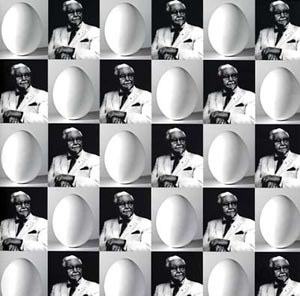In an interview for Wire magazine in 2011 Bill Orcutt commented that, “{Gertrude} Stein says repetition doesn’t exist {…} it’s only insisting on the same thing over and over again.” Of late, Orcutt himself has become something of the insistent pioneer. Former guitarist for Miami noise-outfit Harry Pussy, he released A New Way to Pay Old Debts after a break of almost ten years. Its marked, and much-noted, shift from the electric guitar and drums of Harry Pussy to solo acoustic recordings made for a template that was evidently Orcutt, but also distinct. Since then his technique has continued to develop, with How The Thing Sings mediating between sorrowful improvisations and caustic collisions of note patterns.
Distinct as well has been the presence of Orcutt’s voice, caught climatically yelping on the first album, before gaining a greater role by the second. How then to approach this, an LP of live recordings with drummer Chris Corsano, the inset image of which shows the two musicians mid-performance with an electric guitar and full drum-kit? Is it intended as a return to the days of Harry Pussy, an eschewal of the delicacy that manifested in the more meditative moments of How The Thing Sings?
The answer is no. Adris Hoyos, who played drums in Harry Pussy, tapped into a form of violent anti-playing that sounded like drums dropped out of a cargo plane. By contrast, Corsano is a more nuanced, more technical drummer. Simultaneously, Orcutt’s electric playing is looser than before. This is partially due to the duo’s approach to improvisation, with Corsano’s drums providing an explosive lead to Orcutt’s wandering guitar-work. Within the first few minutes of the opening track (none of the improvisations are named) they settle into a pattern of exchange that trades-off between moments of comparative melodic clarity and instances of chaos.
Chaos is likely to be the listener’s initial impression, for Orcutt and Corsano provide very little to grip onto in an immediate sense. However, a little perseverance is to be begged, as The Raw And The Cooked yields numerous rewards with repeated listens. As with Orcutt’s solo work, motifs develop and find footholds in unusual and thrilling ways: a cluster burst of notes, a long wheeling improvisation compressed suddenly into a squall. Its elements like these that build the gradient charge.
Orcutt has spoken of his love of the blues, and much of the coverage of his music cites those early bluesmen alongside more left-field influences such as Derek Bailey. These touchstones are not so evident on The Raw And The Cooked, the playing giving itself over to a gathered weirdness that owes more to free jazz or noise. The switch to electric guitar has the benefit of throwing feedback into the improvisations, used to greatest effect when it is sustained as a counterpoint to Corsano’s playing. Orcutt’s voice can be heard occasionally in the quieter moments. Its best appearance is a yelp at the end of one particularly frenetic piece of playing, an interjection oddly reminiscent of the Goons.
Those sceptical of Orcutt’s aesthetic might argue that his particular brand of insistence is too hermetic and esoteric to warrant praise. However, the playing on The Raw And The Cooked demonstrates a fiercely singular approach, one that continues to evolve ahead of its peers. It lends itself to an analogy of fractal development, becoming more complex and dense with each repetition. Whatever strange influence it will exert, The Raw And The Cooked is the sound of a quiet radical becoming loud once again.


